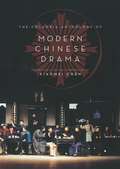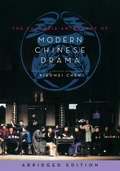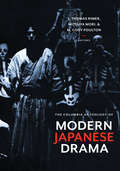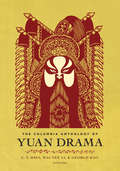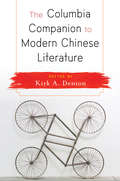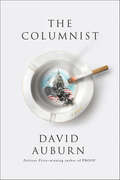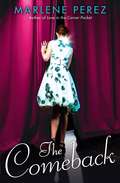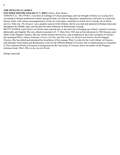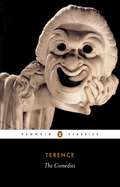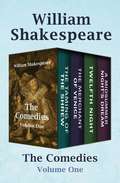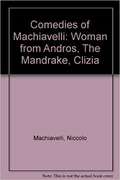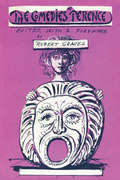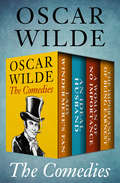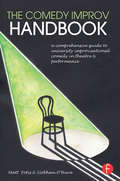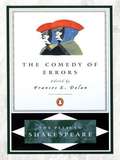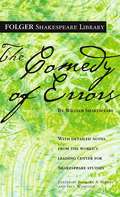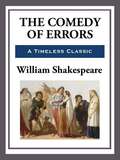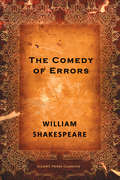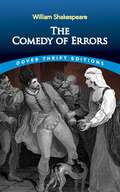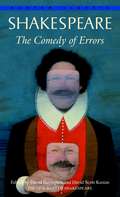- Table View
- List View
The Columbia Anthology of Modern Chinese Drama
by Xiaomei ChenThe first of its kind in English, this anthology presents translations of twenty-two popular plays published between 1919 and 2000, accompanied by an introduction to the historical, cultural, and aesthetic evolution of twentieth-century Chinese spoken drama. Primarily comprising works from the People's Republic of China, though including representative plays from Hong Kong and Taiwan, this collection showcases more than the revolutionary rethinking of Chinese theater and performance that began in the late Qing dynasty. It also reflects the formation of Chinese national and gender identities during a period of tremendous social and political change, as well as the genesis of contemporary attitudes toward the West.Early twentieth-century Chinese drama embodies the uncertainty and anxiety brought on by modernism, socialism, political conflict, and war. After 1949, the PRC theater paints a complex portrait of the rise of Communism in China, with the ideals of Chinese socialism juxtaposed against the sacrifices made for a new society. The Cultural Revolution promoted a "model theater" cultivated from the achievements of earlier, leftist spoken drama, despite the fact that this theater arose from the destruction of old culture. Post-Mao drama addresses the Chairman's legacy and the attempts of a wounded nation to reexamine its cultural roots. Taiwan's spoken drama uniquely synthesizes regional and foreign traditions, and Hong Kong's spoken drama sparkles as a hybrid of Chinese and Western influences. Immensely valuable for scholars of cross-disciplinary, comparative, and performance study, this anthology offers essential perspective on the theatricality and representation of political life.
The Columbia Anthology of Modern Chinese Drama (Weatherhead Books on Asia)
by Ed. Chen XiaomeiThe first of its kind in English, this anthology translates twenty-two popular Chinese plays published between 1919 and 2000, accompanied by a critical introduction to the historical, cultural, and aesthetic evolution of twentieth-century Chinese spoken drama. Primarily comprising works from the People's Republic of China, though including representative plays from Hong Kong and Taiwan, this collection not only showcases the revolutionary rethinking of Chinese theater and performance that began in the late Qing dynasty. It also highlights the formation of Chinese national and gender identities during a period of tremendous social and political change, along with the genesis of contemporary attitudes toward the West.Early twentieth-century Chinese drama embodies the uncertainty and anxiety brought on by modernism, socialism, political conflict, and war. After 1949, PRC theater painted a complex portrait of the rise of communism in China, with the ideals of Chinese socialism juxtaposed against the sacrifices made for a new society. The Cultural Revolution promoted a "model theater" cultivated from the achievements of earlier, leftist spoken drama, even though this theater arose from the destruction of old culture. Post-Mao drama addresses the socialist legacy and the attempts of a wounded nation to reexamine its cultural roots. Taiwan's spoken drama synthesizes regional and foreign traditions, and Hong Kong's spoken drama sparkles as a hybrid of Chinese and Western influences. Immensely valuable for cross-disciplinary, comparative, and performance study, this anthology provides essential perspective on China's theatricality and representation of political life.
The Columbia Anthology of Modern Chinese Drama: abridged edition (Weatherhead Books on Asia)
by Xiaomei ChenThis condensed anthology reproduces close to a dozen plays from Xiaomei Chen's well-received original collection, The Columbia Anthology of Modern Chinese Drama, along with her critical introduction to the historical, cultural, and aesthetic evolution of twentieth-century Chinese spoken drama. Comprising representative works from the Republican era to postsocialist China, the book encapsulates the revolutionary rethinking of Chinese theater and performance that began in the late Qing dynasty and vividly portrays the uncertainty and anxiety brought on by modernism, socialism, political conflict, and war. Chosen works from 1919 to 1990 also highlight the formation of national and gender identities during a period of tremendous social, cultural, and political change in China and the genesis of contemporary attitudes toward the West. PRC theater tracks the rise of communism, juxtaposing ideals of Chinese socialism against the sacrifices made for a new society. Post-Mao drama addresses the nation's socialist legacy, its attempt to reexamine its cultural roots, and postsocialist reflections on critical issues such as nation, class, gender, and collective memories. An essential, portable guide for easy reference and classroom use, this abridgment provides a concise yet well-rounded survey of China's theatricality and representation of political life. The original work not only established a canon of modern Chinese drama in the West but also made it available for the first time in English in a single volume.
The Columbia Anthology of Modern Japanese Drama
by J. Thomas M. Cody Poulton Mori Rimer MitsuyaThis anthology is the first to survey the full range of modern Japanese drama and make available Japan's best and most representative twentieth- and early-twenty-first-century works in one volume. It opens with a comprehensive introduction to Meiji-period drama and follows with six chronological sections: "The Age of Taisho Drama"; The Tsukiji Little Theater and Its Aftermath"; "Wartime and Postwar Drama"; "The 1960s and Underground Theater"; "The 1980s and Beyond"; and "Popular Theater," providing a complete history of modern Japanese theater for students, scholars, instructors, and dramatists. The collection features a mix of original and previously published translations of works, among them plays by such writers as Masamune Hakucho (The Couple Next Door), Enchi Fumiko (Restless Night in Late Spring), Morimoto Kaoru (A Woman's Life), Abe Kobo (The Man Who Turned into a Stick), Kara Juro (Two Women), Terayama Shuji (Poison Boy), Noda Hideki (Poems for Sale), and Mishima Yukio (The Sardine Seller's Net of Love). Leading translators include Donald Keene, J. Thomas Rimer, M. Cody Poulton, John K. Gillespie, Mari Boyd, and Brian Powell. Each section features an introduction to the developments and character of the period, notes on the plays' productions, and photographs of their stage performances. The volume complements any study of modern Japanese literature and modern drama in China, Korea, or other Asian or contemporary Western nations.
The Columbia Anthology of Modern Japanese Drama
by J. Thomas Rimer M. Cody Poulton Mitsuya MoriThis anthology is the first to survey the full range of modern Japanese drama and make available Japan's best and most representative twentieth- and early-twenty-first-century works in one volume. Divided into six chronological sections: "The Age of Taisho Drama"; The Tsukiji Tsukiji Little Theater and Its Aftermath"; "Wartime and Postwar Drama"; "The 1960s and Underground Theater"; "The 1980s and Beyond"; and "Popular Theater," the collection opens with a comprehensive introduction to Meiji period drama and provides an informal yet complete history of twentieth-century Japanese theater for students, scholars, instructors, and dramatists. The collection features a mix of original and previously published translations of works, among them plays by such writers as Masamune Hakucho (The Couple Next Door), Enchi Fumiko (Restless Night in Late Spring), Abe Kobo (The Man Who Turned into a Stick), Morimoto Kaoru (A Woman's Life), Kara Juro (Two Women), Terayama Shuji (Poison Boy), Noda Hideki (Poems for Sale), and Mishima Yukio (The Sardine Seller's Net of Love). Leading translators include Donald Keene, J. Thomas Rimer, Mitsuyra Mori, M. Cody Poulton, John Gillespie, Mari Boyd, and Brian Powell. Each section features an introduction to the developments and character of the period, notes on the plays' productions, and photographs of their stage performances. The volume complements any course on modern Japanese literature and any study of modern drama in China, Korea, or other Asian or contemporary Western nation.
The Columbia Anthology of Modern Japanese Drama
by J. Thomas Rimer M. Cody Poulton Mitsuya MoriThis anthology is the first to survey the full range of modern Japanese drama and make available Japan's best and most representative twentieth- and early-twenty-first-century works in one volume. Divided into six chronological sections: "The Age of Taisho Drama"; The Tsukiji Tsukiji Little Theater and Its Aftermath"; "Wartime and Postwar Drama"; "The 1960s and Underground Theater"; "The 1980s and Beyond"; and "Popular Theater," the collection opens with a comprehensive introduction to Meiji period drama and provides an informal yet complete history of twentieth-century Japanese theater for students, scholars, instructors, and dramatists. The collection features a mix of original and previously published translations of works, among them plays by such writers as Masamune Hakucho (The Couple Next Door), Enchi Fumiko (Restless Night in Late Spring), Abe Kobo (The Man Who Turned into a Stick), Morimoto Kaoru (A Woman's Life), Kara Juro (Two Women), Terayama Shuji (Poison Boy), Noda Hideki (Poems for Sale), and Mishima Yukio (The Sardine Seller's Net of Love). Leading translators include Donald Keene, J. Thomas Rimer, Mitsuyra Mori, M. Cody Poulton, John Gillespie, Mari Boyd, and Brian Powell. Each section features an introduction to the developments and character of the period, notes on the plays' productions, and photographs of their stage performances. The volume complements any course on modern Japanese literature and any study of modern drama in China, Korea, or other Asian or contemporary Western nation.
The Columbia Anthology of Yuan Drama
by George Kao C. T. Hsia Wai-Yee LiThis anthology features translations of ten seminal plays written during the Yuan dynasty (1279--1368), a period considered the golden age of Chinese theater. By turns lyrical and earthy, sentimental and ironic, Yuan drama spans a broad emotional, linguistic, and stylistic range. Combining sung arias with declaimed verses and doggerels, dialogues and mime, and jokes and acrobatic feats, Yuan drama formed a vital part of China's culture of performance and entertainment in the thirteenth and fourteenth centuries.To date, few Yuan-dynasty plays have been translated into English. Well-known translators and scholars have supervised the making of this collection and add a short description to each play. A general introduction situates all selections within their cultural and historical contexts.
The Columbia Anthology of Yuan Drama (Translations from the Asian Classics)
by Hsia C. T. Li George Kao Wai-YeeThis anthology features translations of ten seminal plays written during the Yuan dynasty (1279–1368), a period considered the golden age of Chinese theater. By turns lyrical and earthy, sentimental and ironic, Yuan drama spans a broad emotional, linguistic, and stylistic range. Combining sung arias with declaimed verses and doggerels, dialogues and mime, and jokes and acrobatic feats, Yuan drama formed a vital part of China's culture of performance and entertainment in the thirteenth and fourteenth centuries.To date, few Yuan-dynasty plays have been translated into English. Well-known translators and scholars have supervised the making of this collection and add a short description to each play. A general introduction situates all selections within their cultural and historical contexts.
The Columbia Companion to Modern Chinese Literature
by Kirk A. DentonThe Columbia Companion to Modern Chinese Literature features more than fifty short essays on specific writers and literary trends from the Qing period (1895–1911) to the present. The volume opens with thematic essays on the politics and ethics of writing literary history, the formation of the canon, the relationship between language and form, the role of literary institutions and communities, the effects of censorship, the representation of the Chinese diaspora, the rise and meaning of Sinophone literature, and the role of different media in the development of literature. Subsequent essays focus on authors, their works, and the schools with which they were aligned, featuring key names, titles, and terms in English and in Chinese characters. Woven throughout are pieces on late Qing fiction, popular entertainment fiction, martial arts fiction, experimental theater, post-Mao avant-garde poetry, post–martial law fiction from Taiwan, contemporary genre fiction from China, and recent Internet literature. The volume includes essays on such authors as Liang Qichao, Lu Xun, Shen Congwen, Eileen Chang, Jin Yong, Mo Yan, Wang Anyi, Gao Xingjian, and Yan Lianke. Both a teaching tool and a go-to research companion, this volume is a one-of-a-kind resource for mastering modern literature in the Chinese-speaking world.
The Columnist: A Play
by David AuburnA new play from the Pulitzer- and Tony Award–winning author of Proof, coming to Broadway this AprilIn midcentury America, newspaper columnists are kings—and Joseph Alsop wears the biggest crown. Joe sits at the nexus of Washington life: beloved, feared, and courted in equal measure by the very people whose careers and futures he determines. But as the sixties dawn and America undergoes dizzying change, the intense political dramas Joe has been throwing his weight around in—supporting the war in Vietnam and Soviet containment, criticizing student activism—come to bear a profound personal cost.Based on the real-life story of Joe Alsop, whose columns at the time of his 1974 retirement were running three times a week in more than three hundred newspapers, David Auburn's The Columnist is a deft blend of history and storytelling. A hilarious, searing portrait of the glorious rewards and devastating losses that accompany ego, ambition, and the pursuit of power, The Columnist pens a vital letter from a radically changing decade to our own turbulent era.
The Comeback
by Marlene PerezSophie Donnelly is one half of the most popular and powerful couple in school,until new girl Angie Vogel shows up and compromises everything. Angie steals Sophie's starring role in the school play, and, worse, her super-popular boyfriend. Sophie has been quickly dispatched to social Siberia, but not for long -- she'll do anything it takes to make a triumphant comeback. From the author of the witty, romantic novel "Love in the Corner Pocket" comes a story about high school royalty and what it takes to stay on the throne.
The Comedies
by Terence Betty RadiceThe Roman dramatist Terence (c. 186-159 BC) adapted many of his comedies from Greek sources, rendering them suitable for audiences of his own time by introducing subtler characterization and more complex plots. <p><p>In his romantic play, The Girl from Andros, Terence portrays a love affair saved by a startling discovery. The Self-Tormentor focusses on a man's remorse after sending his son to war, and The Eunuch depicts a case of mistaken identity. Phormio is as rich in intrigue as a French farce, while The Mother-in-Law shows two families striving to save a marriage and The Brothers contrasts strict and lenient upbringings. <p><p>With their tight plots and spare dialogue, Terence gave his plays a sense of humanity that became a model in the Renaissance and greatly influenced Molière.
The Comedies
by TerenceThe Roman dramatist Terence (c. 186-159 BC) adapted many of his comedies from Greek sources, rendering them suitable for audiences of his own time by introducing subtler characterization and more complex plots. In his romantic play, The Girl from Andros, Terence portrays a love affair saved by a startling discovery. The Self-Tormentor focusses on a man's remorse after sending his son to war, and The Eunuch depicts a case of mistaken identity. Phormio is as rich in intrigue as a French farce, while The Mother-in-Law shows two families striving to save a marriage and The Brothers contrasts strict and lenient upbringings. With their tight plots and spare dialogue, Terence gave his plays a sense of humanity that became a model in the Renaissance and greatly influenced Molière.
The Comedies Volume One: The Taming of the Shrew, The Merchant of Venice, Twelfth Night, and A Midsummer Night's Dream
by William ShakespeareLove, enchantment, and misadventure abound in four timeless comedies by the great Bard of Elizabethan England.The Taming of the Shrew: After a battle of wits, the suitor Petruchio marries the headstrong lady Katherina and brings her to his home in Verona, where he sets about &“taming&” his willful bride into an obedient wife.The Merchant of Venice: In the most dramatic of Shakespeare&’s comedies, a wealthy Venetian merchant is unable to repay a loan from the moneylender Shylock—who demands a pound of the borrower&’s flesh.Twelfth Night: In this comedy of unrequited love and mistaken identity, Viola disguises herself as a man in the service of the lovesick Duke Orsino—whom she adores. The duke sends Viola to woo Countess Olivia who, in turn, falls in love with Viola&’s male persona.A Midsummer Night&’s Dream: The mischievous wood sprite Puck wreaks havoc on the romantic pursuits of four young lovers while a hapless actor is transformed into a fairy queen&’s monstrous consort in this beloved comic fantasia.
The Comedies of Machiavelli: The Woman from Andros the Mandrake Clizia
by Machiavelli NiccoloThe Woman from Andros; The Mandrake; Clizia.
The Comedies of Terence
by Robert GravesTerence achieved in his brief twenty-six years a standard of stylistic perfection and artistic restraint that ranked him, along with Plautus, as the greatest of the Roman comic playwrights. He was, at the very least, a gifted translator and adaptor, having used Greek New Comedies as the basis for all six of his extant plays. How far his own contribution exceeded that of simple translation is difficult to say, but we know that the Latin, undeniably his, was so faultlessly styled that his work served as a textbook for scholars and grammarians for hundreds of years.Terence had a considerable impact on the Revival of Letters; his comedies were studied and were frequently adapted into new works by such men as Steele, Chapman, and, most famously, Moliire. Indeed, had there been no Terence, it is doubtful that the Comedy of Manners could have arisen when it did, and all comic writing for the stage, from Moilire through the Restoration drama to the present day, would be diminished for lack of him. Appropriately, the language of this translation is from the Restoration. Graves has based his version on the one made in 1689 by Laurence Echard; he has corrected inaccuracies, eliminated defects and obscurities, but retained the period tone.Including in this book are the major comedies: The Fair Andrian, The Mother-In-Law, The Self-Tormentor, The Eunuch, The Tricks of Phormio and The Brothers. A close reading of Terence is a fine corrective to any idea that may still be current, about the glory that was Greece and grandeur that was Rome during the Hellenistic period. It is an assurance that in some respects at least, this age is not depraved at all.
The Comedies: Lady Windermere's Fan, An Ideal Husband, A Woman of No Importance, and The Importance of Being Earnest
by Oscar WildeExperience the wit of Wilde in these four delightfully satiric plays—including his masterpiece, The Importance of Being Earnest. In the late nineteenth century, Oscar Wilde&’s plays were the toast of London, celebrated for the Irish playwright&’s mischievous wit, pointed social satire, and gift for energetic farce. Lady Windermere&’s Fan: Gossip leads Lady Windermere to believe her husband is having an affair, and when the woman in question appears at her party, she makes an impulsive choice that threatens to destroy her reputation. An Ideal Husband: When a femme fatale blackmails prestigious politician Sir Robert Chittern, his wife is forced to re-evaluate her standards for &“an ideal husband.&” A Woman of No Importance: Young Gerald Arbuthnot is honored to be chosen as secretary to the sophisticated—and flirtatious—Lord Illingworth. So why does Gerald&’s mother oppose the appointment? The Importance of Being Earnest: In the playful sendup of Victorian courtship and manners, bachelors Jack and Algernon each woo ladies using the ironic alias of &“Ernest.&”
The Comedy Improv Handbook: A Comprehensive Guide to University Improvisational Comedy in Theatre and Performance
by Matt Fotis Siobhan O'HaraThe Comedy Improv Handbook: A Comprehensive Guide to University Improvisational Comedy in Theatre and Performance is a one-stop resource for both improv teachers and students, covering improv history, theory, maxims, exercises, games, and structures. You will learn the necessary skills and techniques needed to become a successful improviser, developing a basic understanding of the history of improvisation and its major influences, structures, and theories. This book also addresses issues associated with being a college improviser – like auditions, rehearsals, performances, and the dynamics of improv groups.
The Comedy of Errors
by William Shakespeare Stephen Orgel A. R. Braunmuller Frances E. Dolan"I feel that I have spent half my career with one or another Pelican Shakespeare in my back pocket. Convenience, however, is the least important aspect of the new Pelican Shakespeare series. Here is an elegant and clear text for either the study or the rehearsal room, notes where you need them and the distinguished scholarship of the general editors, Stephen Orgel and A. R. Braunmuller who understand that these are plays for performance as well as great texts for contemplation." (Patrick Stewart) The distinguished Pelican Shakespeare series, which has sold more than four million copies, is now completely revised and repackaged. Each volume features: * Authoritative, reliable texts * High quality introductions and notes * New, more readable trade trim size * An essay on the theatrical world of Shakespeare and essays on Shakespeare's life and the selection of texts
The Comedy of Errors
by William Shakespeare Paul Werstine Dr Barbara MowatShakespeare's Comedy of Errors is the slapstick farce of his youth. In it, the lost twin sons of the old merchant Egeon--both named Antipholus--find themselves in Ephesus, without either one even knowing of the other's existence. Meanwhile, Egeon has arrived in search of the son he thinks is still alive--and has been sentenced to death for the "crime" of being from Syracuse. To add to the confusion, the two Antipholuses have twin servants, both named Dromio. As the four men unwittingly encounter each other, the play is crammed with wildly escalating misunderstandings before the truth emerges and Egeon is pardoned. Shakespeare bases his story on Plautus's Menaechmi, a play about identical twins who accidentally meet after a lifetime apart. He borrows from another Plautus play by having Adriana, the wife of one Antipholus, entertain the other. The spirited Adriana often gives speeches evoking strong emotions--as do other characters at times. Even here, Shakespeare suggests complexities beyond the farce. The authoritative edition of The Comedy of Errors from The Folger Shakespeare Library, the trusted and widely used Shakespeare series for students and general readers, is now available as an eBook. Features include: · The exact text of the printed book for easy cross-reference · Hundreds of hypertext links for instant navigation · Freshly edited text based on the best early printed version of the play · Full explanatory notes conveniently placed on pages facing the text of the play · Scene-by-scene plot summaries · A key to famous lines and phrases · An introduction to reading Shakespeare's language · Illustrations from the Folger Shakespeare Library's vast holdings of rare books · An essay by a leading Shakespeare scholar providing a modern perspective on the play
The Comedy of Errors
by William ShakespeareBook Description The shortest and probably earliest of Shakespeare's comedies, The Comedy of Errors is the story of identical twin brothers who are raised apart-and then mistaken for each other.
The Comedy of Errors
by William ShakespeareTwo sets of identical twins provide the basis for ongoing incidents of mistaken identity, within a lively plot of quarrels, arrests, and a grand courtroom denouement. One of Shakespeare's earliest dramatic efforts, the play abounds in his trademark conceits, puns, and other forms of fanciful wordplay, foreshadowing his later and greater comedies.
The Comedy of Errors
by William ShakespeareIdentical twins separated at birth provides the foundation for humour in one of Shakespeare's earlier plays. The young twin sons of Egeon, alongside another set of young twin boys, purchased as slaves, are lost to one another during a tempest at sea. As each searches for the other, the stage is set for a romp that revolves around mistaken identity, physical mishaps, and the comedy of errors referenced in the title.
The Comedy of Errors
by William ShakespeareBased on a pair of comic dramas from ancient Rome, The Comedy of Errors presents a spectacle of pure farce in the spirit of utmost fun and -- as the title suggests -- hilarious confusion. Two sets of identical twins provide the basis for ongoing incidents of mistaken identity, within a lively plot of quarrels, arrests, and a grand courtroom denouement. One of Shakespeare's earliest dramatic efforts, the play abounds in his trademark conceits, puns, and other forms of fanciful wordplay. It also foreshadows his later and greater comedies, offering students and scholars a valuable key to the playwright's development.
The Comedy of Errors
by William ShakespeareBook Description The shortest and probably earliest of Shakespeare's comedies, The Comedy of Errors is the story of identical twin brothers who are raised apart-and then mistaken for each other.
